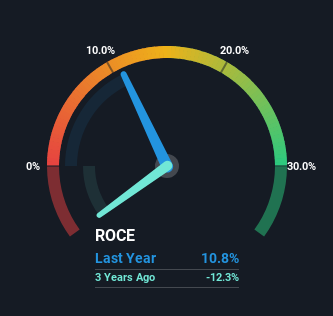Air Canada (TSE:AC) Has More To Do To Multiply In Value Going Forward
What trends should we look for it we want to identify stocks that can multiply in value over the long term? Typically, we'll want to notice a trend of growing return on capital employed (ROCE) and alongside that, an expanding base of capital employed. This shows us that it's a compounding machine, able to continually reinvest its earnings back into the business and generate higher returns. So, when we ran our eye over Air Canada's (TSE:AC) trend of ROCE, we liked what we saw.
Understanding Return On Capital Employed (ROCE)
For those who don't know, ROCE is a measure of a company's yearly pre-tax profit (its return), relative to the capital employed in the business. To calculate this metric for Air Canada, this is the formula:
Return on Capital Employed = Earnings Before Interest and Tax (EBIT) ÷ (Total Assets - Current Liabilities)
0.11 = CA$2.2b ÷ (CA$30b - CA$9.3b) (Based on the trailing twelve months to September 2023).
Therefore, Air Canada has an ROCE of 11%. In absolute terms, that's a satisfactory return, but compared to the Airlines industry average of 8.5% it's much better.
Check out our latest analysis for Air Canada

In the above chart we have measured Air Canada's prior ROCE against its prior performance, but the future is arguably more important. If you're interested, you can view the analysts predictions in our free report on analyst forecasts for the company.
How Are Returns Trending?
While the current returns on capital are decent, they haven't changed much. The company has consistently earned 11% for the last five years, and the capital employed within the business has risen 40% in that time. Since 11% is a moderate ROCE though, it's good to see a business can continue to reinvest at these decent rates of return. Over long periods of time, returns like these might not be too exciting, but with consistency they can pay off in terms of share price returns.
The Key Takeaway
The main thing to remember is that Air Canada has proven its ability to continually reinvest at respectable rates of return. However, despite the favorable fundamentals, the stock has fallen 33% over the last five years, so there might be an opportunity here for astute investors. For that reason, savvy investors might want to look further into this company in case it's a prime investment.
If you'd like to know more about Air Canada, we've spotted 2 warning signs, and 1 of them is potentially serious.
While Air Canada may not currently earn the highest returns, we've compiled a list of companies that currently earn more than 25% return on equity. Check out this free list here.
New: Manage All Your Stock Portfolios in One Place
We've created the ultimate portfolio companion for stock investors, and it's free.
• Connect an unlimited number of Portfolios and see your total in one currency
• Be alerted to new Warning Signs or Risks via email or mobile
• Track the Fair Value of your stocks
Have feedback on this article? Concerned about the content? Get in touch with us directly. Alternatively, email editorial-team (at) simplywallst.com.
This article by Simply Wall St is general in nature. We provide commentary based on historical data and analyst forecasts only using an unbiased methodology and our articles are not intended to be financial advice. It does not constitute a recommendation to buy or sell any stock, and does not take account of your objectives, or your financial situation. We aim to bring you long-term focused analysis driven by fundamental data. Note that our analysis may not factor in the latest price-sensitive company announcements or qualitative material. Simply Wall St has no position in any stocks mentioned.
About TSX:AC
Air Canada
Provides domestic, U.S. transborder, and international airline services.
Very undervalued with low risk.
Similar Companies
Market Insights
Community Narratives




